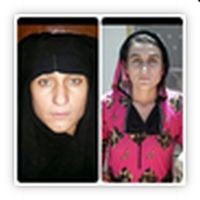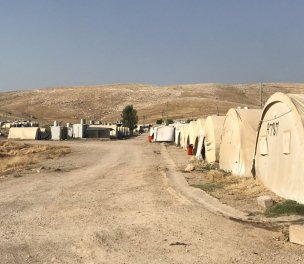Click to read the article in Turkish
A single photograph, but two images: A 28-year-old woman named Leyla.
Everyone I hear speaking about her refers only to the left of the two images, where she is shown wearing a Niqab.
"She also believes in the ISIL ideology," "She has lost her mind," and when my interlocutor says these words, she then points to this  left image.
left image.
Even if there are people who know the Leyla who wears a bright colored tunic, the Leyla of the photo where she wears Burqa is what every Ezidi woman who has refused to give up her child or has struggled to keep it is accused of being.
Leyla has four children. The three eldest were born of her now divorced husband. The youngest, two years old, was born to a ISIL militant from Tunisia, who sexually assaulted her for a full year and a half.
Leyla was taken captive in the ISIL attack on Tel Bahat village, together with several other women and children. ISIL initially held all of them in a school building in Mosul's Tal Afar division. The girl children were sent to Raqqa (Syria) and Mosul (Iraq), then under their control.
Leyla was then sent with her three children, as were other women with children, to a Qaser village in Tal Afar. A Tunisian commander in ISIL bought her at the school she was being kept in and took her and her children with him back to Syria.
And thus began a year of utter suffering for Leyla. During this year, she also frequently witnessed torture and death.
When the Tunisian ISIL militant died after blowing himself up as a suicide bomber in Rutba in Syria, Leyla was several months pregnant.
She was now the widow of a 'Martyr' and, as per the laws of ISIL, was entitled to special treatment. Wives of martyrs had to wait three months before they were married off again or till they gave birth in case they were pregnant.
Leyla was taken to Mayedin in Syria, where a judge divorced her from the dead ISIL militant. She was now 'Halal' and could be married again after giving birth.
Maddafe
Leyla, together with other 'widows' of fallen fighters, was taken to a house in Mayedin, called a 'Maddafe' house where such widows gave birth and waited till they were given in marriage again.
She was reunited with her two elder sons and, sent to Raqqaa together with them, her third daughter and her recently born infant a year later.
Leyla, being the widow of a 'Martyr', was given a monthly salary of one and a half Varak (150 US dollars) and her-11-year-old eldest son was named the man in charge of the house. They were also given two servants to attend to them.
One of civilians helped the family get in touch with Leyla's husband in Duhok. Leyla beseeched him to come and rescue them, but the eldest son proved an obstacle. He would tell his father that their situation was good, they were well treated, everything was as they wanted it and that they had two Avams (civilian servants) who attended to them.
During the battle of Raqqa, ISIL relocated Leyla and her children back in Meyadin, but the sons were separated from Leyla and the other two children. The two civilians who had been in attendance in Raqqa escaped to Turkey where they met with Leyla's husband and telling him they were not ISIL members, told him they could help reunite him his family.
Leyla's husband paid them 5 Varak (500 US Dollars) but it took him six months of daily calls over Facebook to convince his sons to leave Syria and return home. They finally agreed and smugglers helped them escape to Iraq.
A few months later, another smuggler got in touch with Leyla's husband and told him he could arrange for Leyla and her two daughters to be taken to the El Hol camp. After paying them a large ransom, this was arranged. The husband, together with Leyla's parents, went to the El Hol camp and brought her, her daughter and the infant boy back to Iraq.
When Leyla went with them to Iraq, she didn't know that her family would not accept the infant boy. She tried to resist when they told her to send off the child to an orphange, but her protests were of no avail.
This came about, but even when the child was dropped off at the orphanage, Leyla didn't know that the child would be registered as Muslim and that he would be given in adoption to a Muslim family within a week.
Adoption
For six months, Leyla told her husband every day she wanted to see her child and that she could not bear to be apart from him. Her husband and his family had promised her that they would take her to see him if she did want to.
But they made no move to and, unable to take it any longer, Leyla travelled to Mosul from Duhok. But, when she reached the orphanage, she learnt that the child had been given in adoption to a Muslim family in Mosul six months previously.
She spent days in Mosul, going from government office to government office. But, after being told in no uncertain terms by a judge in the Mosul courthouse that 'A child born of a Muslim father may not be given to an Ezidi woman', she gave up and sought to return to her husband and children in Duhok.
Her husband, however, refused to let her return.
Leyla has been in a women's refuge center in Sulaymaniyah for nearly a year now. Like the image on the right, she now wears a colorful patterned blouse and skirt. She responds to the ones who accuse her of 'supporting the ideology of the ISIL' by repeating "the only thing that keeps me going is the hope of seeing my son again."
I was unable to meet her in person and we only spoke on the phone, and it was no more than a short conversation at that. The details in this article were gathered by me from interviews with her husband and children. (NK/SD)
Tomorrow: The Mosul Dar Al-Zahur Orphanage
Êzidî Women Speak Out: 'S/he is My Child'
Zozan's Family: You Have No Choice But to Give up Your Child for Adoption
Meyrem: We are Left With No Choice But to Leave for Afar
Two Sisters, Fahima and Rayan and Their Cousin Seher
The Mosul Dar Al-Zahur Orphanage
'Êzidî Women are Breaking the Mould and Remaking Their Society'











